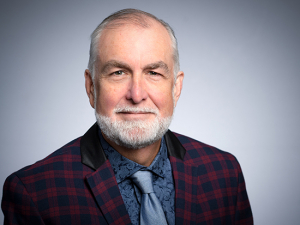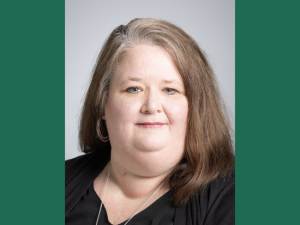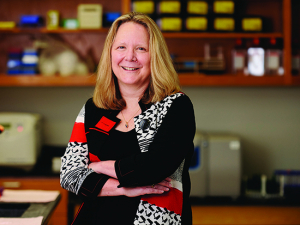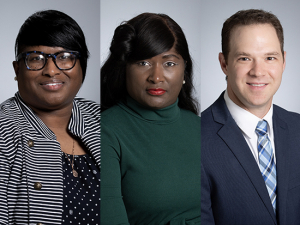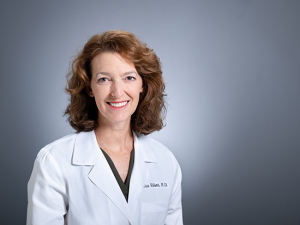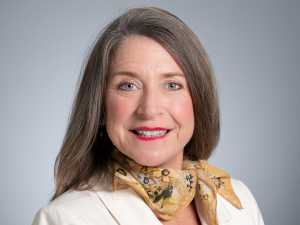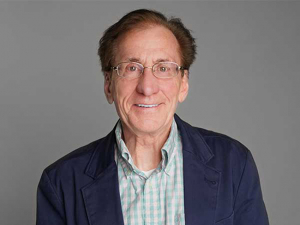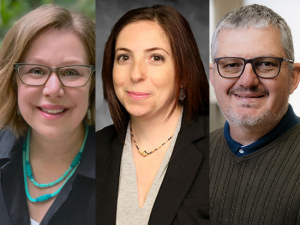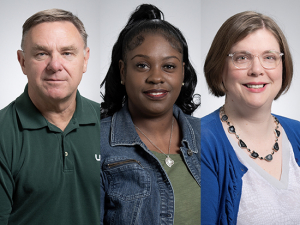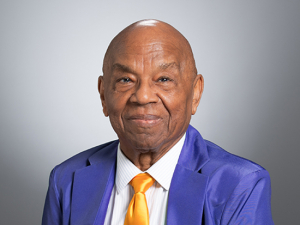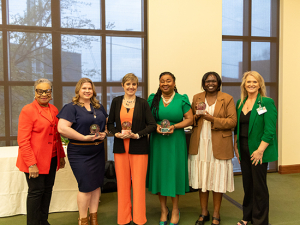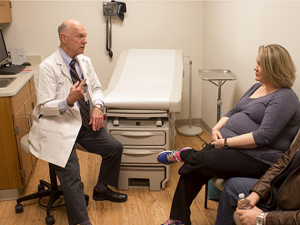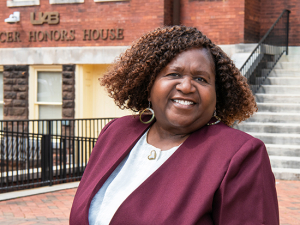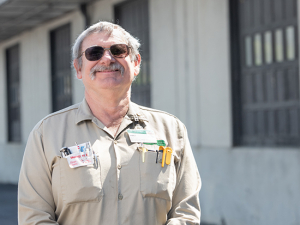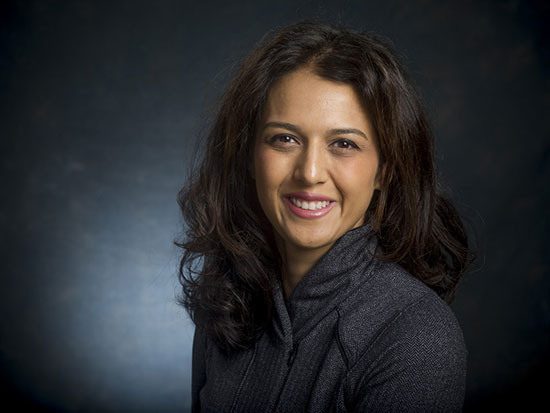 Assistant Professor Henna Budhwani, Ph.D. (above), and John Waters, M.D., of the Caribbean Vulnerable Communities Coalition, received the Robert Carr Research Award at the International AIDS Conference July 8. “Action-oriented, community-participatory research studies such as this project have the potential to transform the current dialogue and elevate conversations related to the human rights of key populations globally,” Budhwani said.How do you get a reliable count of people who often are stigmatized, distrust local authorities —including researchers — and are afraid to be identified?
Assistant Professor Henna Budhwani, Ph.D. (above), and John Waters, M.D., of the Caribbean Vulnerable Communities Coalition, received the Robert Carr Research Award at the International AIDS Conference July 8. “Action-oriented, community-participatory research studies such as this project have the potential to transform the current dialogue and elevate conversations related to the human rights of key populations globally,” Budhwani said.How do you get a reliable count of people who often are stigmatized, distrust local authorities —including researchers — and are afraid to be identified?
That was the problem facing a team of researchers co-led by UAB’s Henna Budhwani, Ph.D., assistant professor in the Department of Health Care Organization and Policy in the School of Public Health, and John Waters, M.D., with the Caribbean Vulnerable Communities Coalition (CVC), an organization of community leaders and non-governmental agencies working with populations that are especially vulnerable to HIV infection or overlooked in treatment and health programs. Their mission: to determine the population size of men who have sex with men, transgender women and female sex workers in six Organisation of Eastern Caribbean States countries.
“Our primary objective was to determine key population size estimates by using different recruitment strategies, demographic methods and statistical triangulation across these methods to produce robust and valid population estimates,” Budhwani said. During the project, the researchers also “assessed the risk profile and current health status of these sub-groups to inform local and regional health policy and advocacy efforts.”
Demographics and statistics, the bedrock of public health research, may sound dry. But the comments of the Honourable Carolyn Gomes, O.J., recipient of the United Nations Prize in the Field of Human Rights, make clear that effective public health researchers must have more than a head for numbers. Budhwani’s “generosity and hunger for truth and efficiency and accuracy and positive change makes her a force to be reckoned with and an invaluable friend to those in need,” Gomes said.
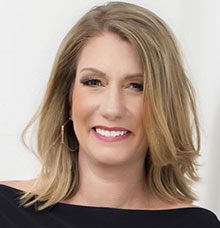 Ria Hearld, Ph.D.Gomes’s remarks came as Budhwani and Waters received the Robert Carr Research Award at the International AIDS Conference July 8. The biennial award is sponsored by the International Council of AIDS Service Organisations, Human Rights Watch, the International AIDS Society and the Center for Public Health and Human Rights at the Johns Hopkins Bloomberg School of Public Health. Named in honor of the pioneering scholar and human rights activist Robert Carr, Ph.D., the award “celebrates Robert’s vision of collaboration between community organizations, academic researchers and advocates to advance human rights-based policies and practices in countries where communities disproportionately affected by HIV continue to face discrimination, social rejection, violence and imprisonment,” according to the ICASO website. “Robert was particularly passionate about the need for cross-disciplinary research to inform policy and advocacy efforts.”
Ria Hearld, Ph.D.Gomes’s remarks came as Budhwani and Waters received the Robert Carr Research Award at the International AIDS Conference July 8. The biennial award is sponsored by the International Council of AIDS Service Organisations, Human Rights Watch, the International AIDS Society and the Center for Public Health and Human Rights at the Johns Hopkins Bloomberg School of Public Health. Named in honor of the pioneering scholar and human rights activist Robert Carr, Ph.D., the award “celebrates Robert’s vision of collaboration between community organizations, academic researchers and advocates to advance human rights-based policies and practices in countries where communities disproportionately affected by HIV continue to face discrimination, social rejection, violence and imprisonment,” according to the ICASO website. “Robert was particularly passionate about the need for cross-disciplinary research to inform policy and advocacy efforts.”
The work led by Budhwani and Waters certainly was cross-disciplinary, involving partnerships across countries, among academic and community leaders and between faculty and students. “Dr. John Waters and Julia Hasbun [with CVC] led the project,” Budhwani said. “Here at UAB, Dr. Ria Hearld [associate professor in the Department of Health Services Administration in the School of Health Professions] was our chief demographer; she conducted the statistical analyses and population size estimates for each sub-group across each country.”
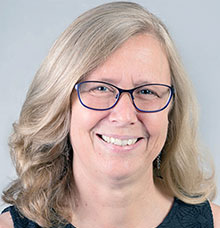 Janet Turan, Ph.D.The UAB team, which also included Janet Turan, Ph.D., professor in the Department of Health Care Organization and Policy and director of the Sparkman Center for Global Health, and Bulent Turan, Ph.D., associate professor in the Department of Psychology, “provided ongoing consultation on decisions about how changes in the survey could affect the data integrity, estimations and subsequent analyses,” Budhwani said. “And Dr. Craig Wilson, emeritus professor of epidemiology in the School of Public Health, who is a stalwart supporter of global development, provided his expert opinion related to HIV risk and clinical considerations.”
Janet Turan, Ph.D.The UAB team, which also included Janet Turan, Ph.D., professor in the Department of Health Care Organization and Policy and director of the Sparkman Center for Global Health, and Bulent Turan, Ph.D., associate professor in the Department of Psychology, “provided ongoing consultation on decisions about how changes in the survey could affect the data integrity, estimations and subsequent analyses,” Budhwani said. “And Dr. Craig Wilson, emeritus professor of epidemiology in the School of Public Health, who is a stalwart supporter of global development, provided his expert opinion related to HIV risk and clinical considerations.”
The study was funded by The Global Fund to Fight AIDS, Tuberculosis and Malaria, with additional funding to support local investigators provided by the UAB Sparkman Center for Global Health. “The CVC team galvanized, trained and built local advocacy networks to conduct place-based surveys and enumerated local populations while also collecting critical data on the health profiles of these highly stigmatized, difficult-to-reach and under-served populations,” Budhwani said. “The UAB investigator team provided scientific support related to socio-behavioral constructs and considerations, sent interns to support local efforts, conducted statistical analyses and developed the countrywide population size estimates that were extrapolated from the base data that were collected.”
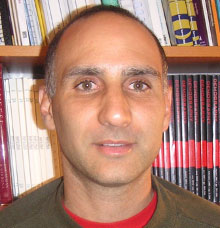 Bulent Turan, Ph.D.Research brings rewarding personal outcomes for university faculty, Budhwani said. The UAB-CVC project engaged UAB students as part of the study, and “imparting knowledge to students, particularly students who want to use their newfound skills to make this world more equitable and socially just,” is particularly rewarding, she said. These projects also enable faculty to help “through the sharing of specialized skills” while at the same time they engage faculty in learning, which is crucial “because knowledge attainment and intellectual growth are lifelong processes,” Budhwani said.
Bulent Turan, Ph.D.Research brings rewarding personal outcomes for university faculty, Budhwani said. The UAB-CVC project engaged UAB students as part of the study, and “imparting knowledge to students, particularly students who want to use their newfound skills to make this world more equitable and socially just,” is particularly rewarding, she said. These projects also enable faculty to help “through the sharing of specialized skills” while at the same time they engage faculty in learning, which is crucial “because knowledge attainment and intellectual growth are lifelong processes,” Budhwani said.
“Our UAB investigator team intellectually evolved through the experience of collaborating with the CVC and local teams related to what would and would not work in Caribbean contexts, while sharing our thoughts on, for example, asynchronous tablet-based survey tools, consideration of which estimation techniques to use and content of the behavioral survey.”
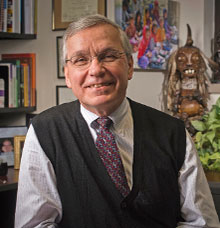 Craig Wilson, M.D.Successful projects also tend to reproduce themselves. “After the completion of this project, the United Nations Development Programme funded the same CVC and UAB research team to conduct a similar population size-estimate project in the country of Belize,” Budhwani said.
Craig Wilson, M.D.Successful projects also tend to reproduce themselves. “After the completion of this project, the United Nations Development Programme funded the same CVC and UAB research team to conduct a similar population size-estimate project in the country of Belize,” Budhwani said.
Participating in studies such as these gives researchers a hand in making real change. Through their Eastern Caribbean study, “the local team, led by the CVC, painstakingly resurrected and developed advocacy networks that gave voice to stigmatized populations, groups that lacked representation,” Budhwani said. “Action-oriented, community-participatory research studies such as this project have the potential to transform the current dialogue and elevate conversations related to the human rights of key populations globally.”

